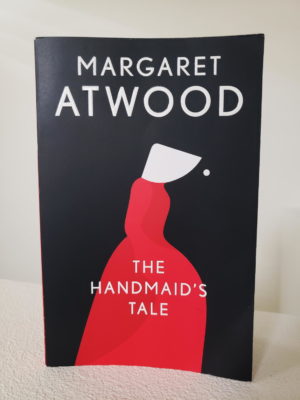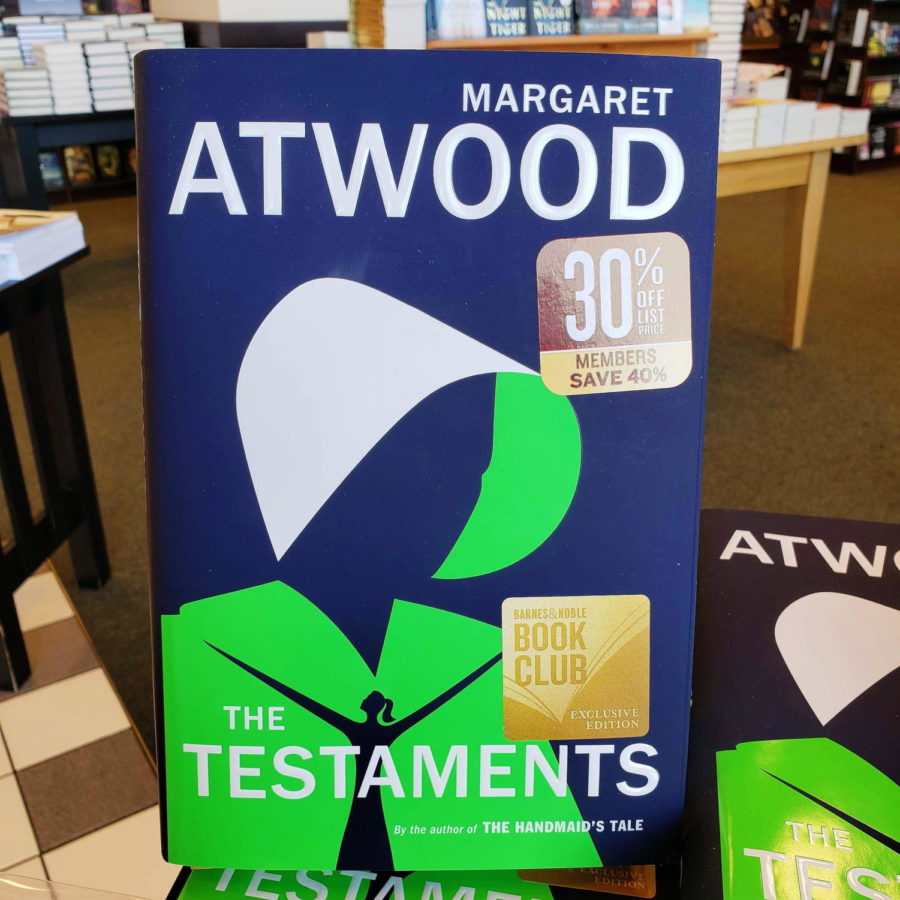Margaret Atwood’s “The Testaments” and what readers are saying about it
“The Testaments,” released September 10.
September 26, 2019
Margaret Atwood’s latest novel, “The Testaments,” was released on September 10. It was the much anticipated sequel to “The Handmaid’s Tale,” and was an immediate hit, skyrocketing to the top of bestseller charts within days of its release. Fans clamored to get their hands on a copy, both older ones who had read “The Handmaid’s Tale” back in the ’80s, and younger ones who discovered the series through the Hulu adaptation. The buzz surrounding the sequel also drew new readers to the series, pushing “The Handmaid’s Tale” to second on the paperback charts 34 years after its first publication, according to Vintage, the book’s publisher.

“The Handmaid’s Tale,” with its iconic red dress and bonnet.
For those who are unfamiliar, “The Handmaid’s Tale” is set in America in the Republic of Gilead, a totalitarian society that rules with strict fundamentalist ideals. An environmental crisis has left many people infertile, and it is the job of the handmaids to produce offspring for the elite. They are stripped of their identities and are forced to have sex with their Commander once a month in the hopes of producing a child for him and his wife. The book is told from the perspective of a handmaid named Offred, and follows the progression of her life in Gilead.
In contrast, “The Testaments” no longer focuses on Offred, and is instead set 15 years after the end of the first story. It’s told in three different voices: two young women—one who has lived in Gilead all her life, and one who lives outside the border—and Aunt Lydia, a character whose malevolence was established in the first book, and was in charge of training women to become handmaids. These differing perspectives (especially Aunt Lydia’s, which caught the attention of many readers) make for an intriguing read, creating a “fraught tale of subterfuge and spycraft as it toggles between the three narratives,” as one critic from USA Today said.
Atwood’s mastery over language lends itself once again in “The Testaments,” creating a haunting and propulsive tale in her direct but breathtaking turns of phrase. As Alex Bennet, a college student who has read the book, puts it, “The book is a quick read but her writing is really good. Her metaphors, the way she describes the most mundane things, it sucks you in.” He goes on to further to describe Atwood’s prose, calling it “inventive and thought provoking.”
In a TIME interview, Atwood says she wrote “The Testaments” in part because she sees the world as “shifting more toward Gilead than away from it,” a sentiment that many others, including Lilliana Yang, 19 years old, agree with. “I think it’s an important issue to think about, especially now with people, men, debating over women’s bodies,” she says, when asked about the connection between Gilead and our own world. She continues, “The stuff that happens in The Handmaid’s Tale really makes you feel kind of scared, but at the same time it’s like, you wanna make sure it doesn’t happen in real life.” A similar statement was echoed many times earlier this year, in response to the passing of the Human Life Protection Act in Alabama this May.
But for all of these praises, many readers deem the sequel “unnecessary.” As Emily May says in a two-star Goodreads review of the book, “I really really hoped Atwood had something important to add to the world of Gilead with this book, but she honestly doesn’t.” She goes on to say that “The Testaments” removed a lot of ambiguity from the original story, ambiguity that was best left untouched. Others call the plot predictable, and the story shallow. But still many others applaud the book’s call to action, its message that inspires women all over the world to speak up.
Whether commending or criticizing, all seem to agree that the release of “The Testaments” is one to be remembered, a call-back to the sense of foreboding that was first delivered to readers by the gripping horrors presented in “The Handmaid’s Tale.” Atwood wants her readers to be afraid, but also—if they dare—to have hope, to always question authority, and to never look down in the face of tyranny.
“The Testaments” is out in stores now.


